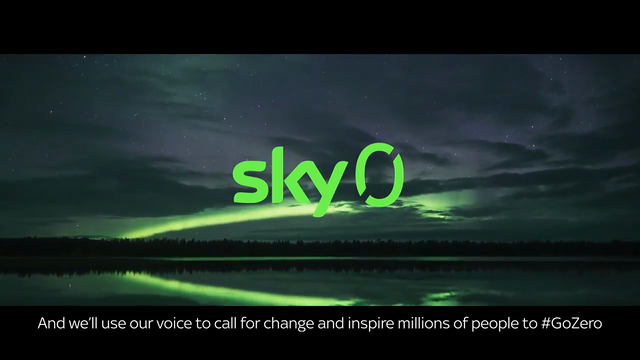Sky Commits To Become Net Zero Carbon By 2030
Sky has today announced plans to go net zero carbon by 2030 by cutting the emissions created from the use of its products, its suppliers across the world and by its business.
Sky will become net zero carbon by making all of its tech products more energy efficient, developing the world’s most sustainable film and TV studios, and by making every Sky original production, TV channel, show and film net zero carbon. Sky will also transform its 5,000 vehicles to create a zero emissions fleet and will help the 11,000 companies that work with Sky, whether they’re making Sky boxes or producing the next hit TV series, on their path to net zero carbon. Additionally, Sky will plant trees, mangroves and seagrass to absorb the carbon it can’t cut yet, seek validation of its targets from the SBTi (Science-Based Target Initiative), and will publicly report its carbon footprint.
Jeremy Darroch, Group Chief Executive, Sky, said, “We are entering a critical decade on the long road to climate recovery, and all businesses have the opportunity to accelerate progress and become part of the solution. Every business depends on and is fundamentally connected to the environment, and we have a responsibility to protect it. We need to take action now – because the world can’t wait. We’re on the journey, and we want to bring everyone with us. Sky Zero will transform our business, advocate for change and inspire our 24 million customers to go zero.”
Transforming its business
Sky’s plans are aligned with limiting the global temperature rise to 1.5°C, showing its commitment to supporting the United Nations Global Compact's Business Ambition for 1.5°C. Sky has been a carbon neutral company from its direct emissions since 2006 and it was the first media company to make that step. It is now starting the next phase of its journey, taking it further and reaching net zero carbon across its entire value chain by 2030.
Sky’s value chain includes the emissions from direct business operations, but also those from 11,000 suppliers and the use of Sky products in the homes of millions of customers.
Sky is also switching its entire fleet of 5,000 vehicles to zero emissions, making products like Sky Q even more efficient and ensuring its new studios, Sky Studios Elstree, are the most sustainable production facilities in the world, with all Sky original productions net zero carbon as well.
Inspiring others to #GoZero
Sky will also use its channels and programming to encourage others to #GoZero, spreading the word to millions of people every day.
Sky has been campaigning for the environment for more than a decade, from Rainforest Rescue to Sky Ocean Rescue, and its channels – like Sky News, Sky Documentaries (launching Spring 2020) and Sky Nature (launching Spring 2020) – will inform audiences and explain how they can start the journey and #GoZero.
Sky Ocean Rescue will continue to champion ocean health with WWF, and rally people to #BeAnOceanHero by pledging to help save our oceans. And Sky’s £25million impact investment fund Sky Ocean Ventures will continue to support innovations stopping the flow of plastic into the sea.
Andrea Leadsom, Secretary of State for Business and Energy, said: “This Government is committed to both tackling climate change and to making the UK the best place in the world to grow a business. An ambitious commitment like this one from Sky shows these can be done at the same time, and I am sure many other businesses will follow suit.”
Tanya Steele, WWF Chief Executive, said: “We are running out of time to act. More companies urgently need to follow Sky’s lead and commit to a science-based target limiting global temperature rise to no more than 1.5°C. The Government must deliver the policies that businesses need to cut their carbon and minimize their impact on nature, not just within their organizations but throughout all their business activities including the products and services they offer to customers.”
Ambassador Luis Alfonso de Alba, UN Special Envoy for the 2019 Climate Action Summit, said: “Climate change requires an unprecedented effort from all sectors of society and business leadership demonstrated by setting science-based targets at 1.5°C will send strong market signals as we look to identify the scalable and replicable solutions needed to secure a world where no one is left behind.”



